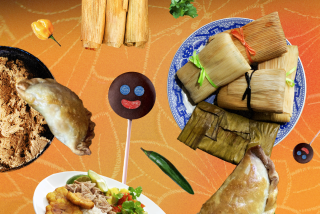Cuba’s U.S.-Flavored Holiday
- Share via
This Christmas, for the first time in almost 40 years, families in Cuba will eat corn and chicken from the United States. In return, farmers in Illinois, Iowa, Kansas and other states will get a $30-million holiday bonus.
Some Americans and Cubans may see this as a miracle, but the truth is simpler. Putting U.S. food on Cuban tables is just good business for both countries. And it’s about time such mutually beneficial pragmatism informed relations between these long-antagonistic neighbors.
Since the 1960s, Fidel Castro has promised that the island he rules would never buy a single grain of U.S. rice or one aspirin, and eight U.S. presidents have reaffirmed the ban on American firms doing business with the communist nation. But when Hurricane Michelle bashed Cuba last month, businesses that had been champing at the bit to reopen this once-lucrative market saw the barn door ajar.
Last year, Congress passed a law that permitted the sale of American food to Cuba for humanitarian purposes but barred government and private U.S. financing of such sales. Scanning the devastation left by Michelle, Castro agreed to pay cash. Despite the predictable wail from conservative Cuban Americans, the sale went through. Castro described his newfound willingness to make the purchase “a friendly response to a friendly gesture.”
So it happened that on Sunday two ships carrying 500 tons of frozen chicken parts and 24,000 tons of corn, sold by U.S. agribusiness giant Archer Daniels Midland, glided into Havana Bay. There is more to come. Through the end of February the Illinois-based conglomerate will send seven more shipments of wheat, soy, rice and other grains to Cuba. This is the first sales contract since the U.S. imposed its embargo in 1963.
Many American businesses and officials argue that free trade builds better relations between nations--even when one is free and the other a repressive dictatorship. Vested interests aside, they’re right. For far too long, the U.S. has watched other countries, including Canada, Spain, Italy and Mexico, take the lead in selling products to Cuba. Now that the door is open, the U.S. needs to start catching up.
In July, the House of Representatives passed an amendment, sponsored by Jeff Flake (R-Ariz.), that would effectively end the decades-long ban on travel to Cuba. Next year, the Senate should pass it, and Congress should keep clearing the way until people and produce flow with reasonable freedom across the 90 miles of water separating the two nations.
More to Read
Sign up for Essential California
The most important California stories and recommendations in your inbox every morning.
You may occasionally receive promotional content from the Los Angeles Times.













